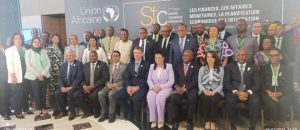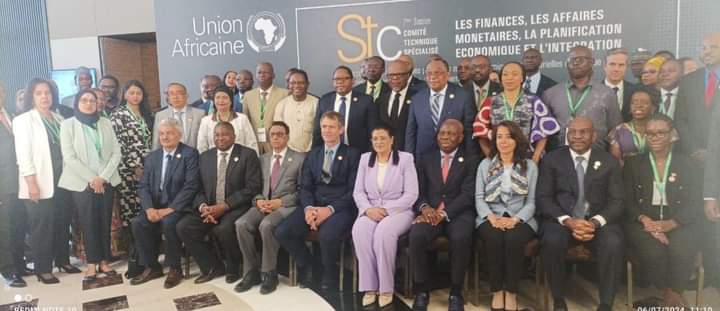By Ncaba Ntshakala
At the 7th Ordinary Session of the Specialized Technical Committee on Finance, Monetary Affairs, Economic Planning, and Integration of the African Union Commission, the Minister of Finance Neal Rijkenberg highlighted a significant economic milestone that despite ongoing global and regional challenges, more than half of African countries experienced higher real GDP growth rates in 2023 compared to 2022.
The meeting, taking place in Tunis, Tunisia, is structured into two segments: the Bureau of Experts segment from July 3-7, and the Ministerial segment from July 6-7. The Kingdom of Eswatini, currently chairing the Specialized Technical Committee, plays a pivotal role in this gathering. Minister Rijkenberg is leading the Ministerial segment as Chairman, supported by Abner Dlamini, Director of Fiscal and Monetary Affairs, who also chaired the Bureau of Experts segment.
ALSO READ: Finance Minister Neal Rijkenberg tables E29.4 billion budget
Jabulane Dlamini, Deputy Director of Balance of Payments and Internal Affairs at the Central Bank of Eswatini, and Siphe-okuhle Fakudze, handling macroeconomic policy coordination, are key participants, addressing crucial issues within their expertise.

In his remarks, Minister Neal Rijkenberg expressed gratitude to the President of Tunisia, Kais Saied, the Tunisian government, and the people of Tunisia for their hospitality.
He emphasized the significance of the session’s theme, “Enhancing Macroeconomic and Sectoral Policies Coordination in Africa: Challenges, Opportunities and Policy Priorities for Inclusive Growth and Sustainable Development,” highlighting its relevance to Africa’s developmental trajectory.
When reflecting on the previous session held in Nairobi, Kenya, under the theme “Africa Beyond Crisis: Charting an Agenda for Investment, Sustainable Growth and Shared Prosperity,” Rijkenberg noted that the current session aims to build on past recommendations.
ALSO READ: Finance Minister Neal Rijkenberg to present over E26bn pro-poor budget
The focus is on ensuring that African policymakers align sectoral policies with macroeconomic strategies to achieve inclusive growth and sustainable development.
Minister Rijkenberg acknowledged the prolonged challenges posed by the Covid-19 pandemic, global insecurity, and climate change, which have created significant economic and financial disruptions. Despite these adversities, Africa’s resilience is evident.
The continent’s growth was estimated at 3.4% in 2023, down from 3.8% in 2022 but still above the global average of 2.7%.
Growth is projected to rebound to 3.8% in 2024 and consolidate at 4.2% in 2025.
“More than half of African countries, 31 to be precise, recorded higher real GDP growth rates in 2023 than in 2022,” stated Rijkenberg.

“Notably, Burkina Faso, Djibouti, Eswatini, Libya, the Republic of Congo, and South Sudan saw growth rate increases of more than 2 percentage points, showcasing better performance than most world regions.”
While celebrating the positive growth trends, Rijkenberg acknowledged that growth remains below the pre-pandemic average of 5% and far short of the 7-10% needed to achieve the Vision and Aspirations of Agenda 2063.
He highlighted the need for enhanced coordination of macroeconomic and sectoral policies to address structural challenges and strengthen sustainable economic performance.
“To accelerate growth and cope with an unfavorable environment, most governments have increased fiscal spending despite declining revenues, leading to unsustainable debt levels,” noted Rijkenberg.
“Africa’s average debt-to-GDP ratio remains high at 60% due to rising financing needs, high debt service costs, and other economic pressures.”
The Minister emphasized that effective policy coordination is crucial for achieving sustainable growth and shared prosperity.
ALSO READ: Finance Minister intervenes in Ecsponent saga
He urged African countries to align their macroeconomic and sectoral policies at national, regional, and continental levels, ensuring that policies are complementary and mutually reinforcing.
“Coordination is needed to enhance the effectiveness of policies aimed at boosting productive capacities through infrastructure development, technology and innovation, climate change mitigation, and financing mechanisms,” he explained.
Rijkenberg also expressed the importance of international cooperation and the African Union’s role as a permanent member of the G20.
He called for a united African stance on critical global issues such as the reform of the international financial system and the pricing of carbon credits.
Highlighting Africa’s significant carbon sink capacity, he advocated for fair pricing of carbon credits to address the continent’s climate adaptation needs.
In his concluding remarks, Minister Rijkenberg called on African leaders to amplify their efforts towards better coordination of macroeconomic and sectoral policies,
emphasizing the potential for unlocking the continent’s economic potential through united and strategic actions.
“The future of African economic growth – and the futures of millions of Africans – is closely tied to the imperative of coordinating macroeconomic and sectoral policies,” he stated.
“In this drive, you can always count on the African Union.”


